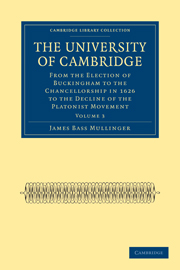Book contents
- Frontmatter
- PREFACE
- Contents
- CHAP. I FROM THE ACCESSION OF CHARLES I TO THE MEETING OF THE LONG PARLIAMENT
- CHAP. II THE EXILES TO AMERICA
- CHAP. III FROM THE MEETING OF THE LONG PARLIAMENT TO THE YEAR 1647. (Nov. 1640—1647.)
- CHAP. IV THE COMMONWEALTH AND THE PROTECTORATE
- CHAP. V THE RESTORATION
- A The Poll of the Election for the Chancellorship in 1626
- B The Manner of the Presentation of the Duke of Buckingham his Grace to the Chancellorship of the University of Cambridge
- C Ordinances established for a publique Lecture of Historie in the University of Cambridge
- D Order of the King at the Court at Whitehall the 30th of Aprill 1630, respecting the Nomination to Lord Brooke's History Lecture
- E Matriculations for the Years 1620–1669
- F Subscriptions on Admission to Holy Orders during the Commonwealth and the Protectorate
- INDEX
CHAP. III - FROM THE MEETING OF THE LONG PARLIAMENT TO THE YEAR 1647. (Nov. 1640—1647.)
Published online by Cambridge University Press: 05 March 2012
- Frontmatter
- PREFACE
- Contents
- CHAP. I FROM THE ACCESSION OF CHARLES I TO THE MEETING OF THE LONG PARLIAMENT
- CHAP. II THE EXILES TO AMERICA
- CHAP. III FROM THE MEETING OF THE LONG PARLIAMENT TO THE YEAR 1647. (Nov. 1640—1647.)
- CHAP. IV THE COMMONWEALTH AND THE PROTECTORATE
- CHAP. V THE RESTORATION
- A The Poll of the Election for the Chancellorship in 1626
- B The Manner of the Presentation of the Duke of Buckingham his Grace to the Chancellorship of the University of Cambridge
- C Ordinances established for a publique Lecture of Historie in the University of Cambridge
- D Order of the King at the Court at Whitehall the 30th of Aprill 1630, respecting the Nomination to Lord Brooke's History Lecture
- E Matriculations for the Years 1620–1669
- F Subscriptions on Admission to Holy Orders during the Commonwealth and the Protectorate
- INDEX
Summary
Dissatisfaction manifested by both parties with the English Universities
Milton's indictment
Returning now to Cambridge and the events which marked the rule of the party there in power, it would not be difficult to shew that, although important in themselves, they can hardly compare in enduring and far-reaching results with those which followed upon the labours of the exiles beyond the seas. The actual state of the university was, indeed, at this time regarded with almost equal dissatisfaction by both of the two great religious parties which divided the country at large, each of them alike admitting that at Cambridge as at Oxford there was much that called for energetic reform. But while Laud interpreted the word as implying a restoration of discipline and an improved ritual, together with the suppression of schism, the Puritan, whether at home or in New England, held that what was chiefly needed was the surrender of all that savoured of Roman doctrine and the revival of a more genuinely spiritual teaching. Distrust and dislike of the existing system at the universities was, in fact, becoming more and more the burden of the Puritan indictment; and Milton, in his pamphlets against prelacy (of which no less than five appeared within eighteen months of the assembling of the Long Parliament), insisted with all the power of his stern and glowing rhetoric, upon the manner in which the ‘ingenuous natures’ of the well-born English youth were being turned aside from ‘the service of God’ to that of ‘prelaty,’ fed as they were ‘with nothing else but the scragged and thorny lectures of monkish and miserable sophistry,’ to be ‘sent home again with such a scholastic bur in their throats as both stopped and hindered all true and generous philosophy from entering.’
- Type
- Chapter
- Information
- The University of Cambridge , pp. 203 - 340Publisher: Cambridge University PressPrint publication year: 2009First published in: 1911



